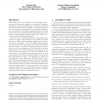Free Online Productivity Tools
i2Speak
i2Symbol
i2OCR
iTex2Img
iWeb2Print
iWeb2Shot
i2Type
iPdf2Split
iPdf2Merge
i2Bopomofo
i2Arabic
i2Style
i2Image
i2PDF
iLatex2Rtf
Sci2ools
SIGMOD
2011
ACM
2011
ACM
No free lunch in data privacy
Differential privacy is a powerful tool for providing privacypreserving noisy query answers over statistical databases. It guarantees that the distribution of noisy query answers changes very little with the addition or deletion of any tuple. It is frequently accompanied by popularized claims that it provides privacy without any assumptions about the data and that it protects against attackers who know all but one record. In this paper we critically analyze the privacy protections offered by differential privacy. First, we use a no-free-lunch theorem, which defines nonprivacy as a game, to argue that it is not possible to provide privacy and utility without making assumptions about how the data are generated. Then we explain where assumptions are needed. We argue that privacy of an individual is preserved when it is possible to limit the inference of an attacker about the participation of the individual in the data generating process. This is different from limiting the inference...
| Added | 17 Sep 2011 |
| Updated | 17 Sep 2011 |
| Type | Journal |
| Year | 2011 |
| Where | SIGMOD |
| Authors | Daniel Kifer, Ashwin Machanavajjhala |
Comments (0)

